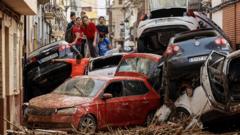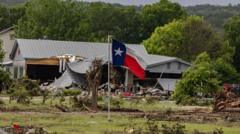Valencia's catastrophic floods have led to a significant death toll due to trapped motorists, poor infrastructure planning, and worsened weather patterns attributed to climate change. Eyewitness accounts reveal the harrowing experiences of those caught in the deluge, highlighting the urgent need for reevaluation of emergency protocols and urban development.
Valencia Floods: A Perfect Storm of Tragedy and Neglect

Valencia Floods: A Perfect Storm of Tragedy and Neglect
The recent devastating floods in Valencia have claimed over 200 lives, exposing critical planning failures and the impact of climate change on such disasters.
In a heartbreaking revelation, the Valencia floods have resulted in a staggering death toll exceeding 200, predominantly affecting the coastal region of Valencia in Spain. The town of Paiporta, with its 25,000 residents, has reported an alarming 62 fatalities as the community grapples with the aftermath of the disaster.
The causes behind the high death toll are multifaceted. A tragic combination of trapped drivers, inadequate response from authorities, and a deluge of rain intensified by climate change has contributed to the crisis. The civil protection agency issued an emergency alert on Tuesday evening, but by then, floodwaters were already rising swiftly in numerous localities, catching citizens off guard as many were returning home from work.
Ill-prepared infrastructure has been underscored by incidents reported in various neighborhoods. Residents found themselves trapped in their cars as floodwaters surged, especially in Paiporta, where the town's unique geography exacerbated the devastation. Mayor Maribel Albalat lamented the town's lack of readiness and a prevailing sense of normalcy regarding flooding, which contributed to the tragic outcomes.
In the nearby neighborhood of La Torre, garages became death traps, with seven bodies recovered from a single residential building's garage. Many individuals instinctively sought refuge in their garages during the downpour, only to face fatal circumstances.
Motorists on the A3 motorway connecting Valencia to Madrid faced precarious decisions as rising waters made it uncertain whether to exit their vehicles or remain inside. Eyewitness accounts reported desperate attempts to stay safe, with one individual strapping himself to a lamppost to prevent being washed away. Alarmingly, the mayor of Chiva warned of “hundreds of cars turned upside down” nearby, suggesting more victims potentially remain trapped within.
Flood response education has since become a priority, as the Guardia Civil advised the public on how to exit vehicles safely during floods.
Further complicating the situation, Valencia's densely populated landscape, coupled with a lack of rainfall previously, rendered the soil incapable of absorbing the sudden onslaught of water. Researcher Pablo Aznar pointed out that unchecked urban development, which has covered vast areas in impermeable materials, heightened the flood risk significantly.
Compounding these issues, scientists have confirmed that climate change played a role in intensifying the rainfall, making it 12% heavier than it would have been otherwise. The World Weather Attribution group's preliminary report indicates that the event was also twice as likely to occur due to the ongoing climate crisis.
As Valencia mourns its tragic loss, there are urgent calls for improved emergency preparedness and urban planning to mitigate future disasters, especially as other regions face similar rainfall alerts.






















